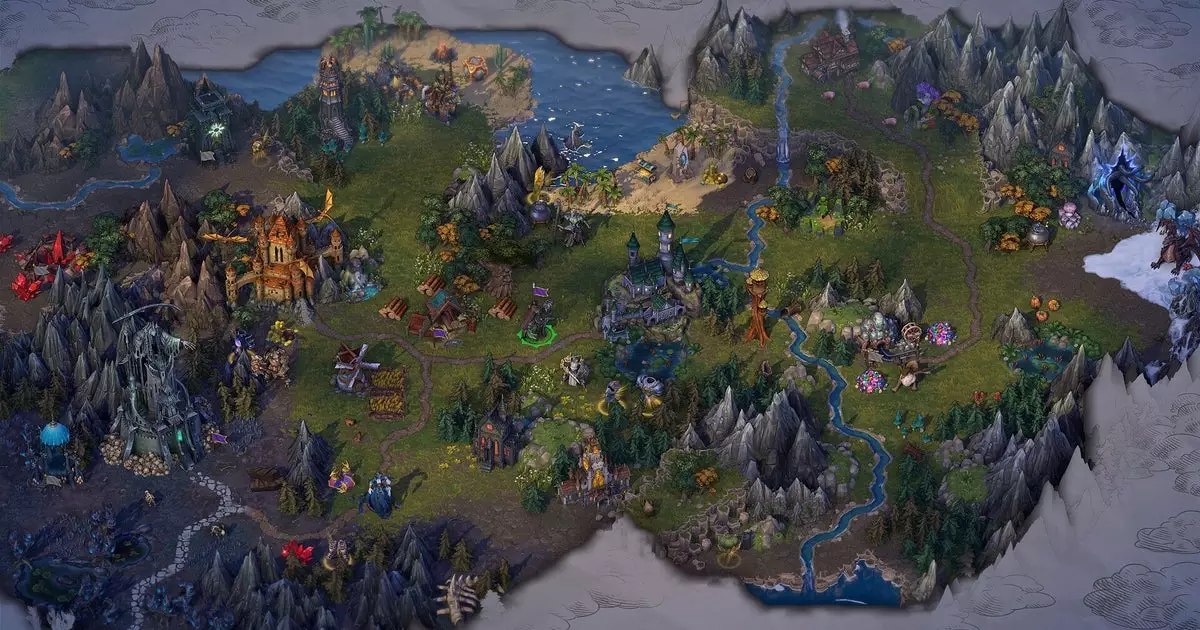In the evolving landscape of game development, the decision by Ubisoft to entrust the publishing responsibilities of *Heroes of Might and Magic: Olden Era* to Hooded Horse marks a significant departure from traditional practices. Historically, major publishers take comprehensive control over distribution and marketing, ensuring a unified brand presence. Yet, here we observe a deliberate decentralization, suggesting a strategic recalibration within Ubisoft’s broader operational framework. The partnership raises a critical question: what compelled Ubisoft to hand over this role?
On one hand, this move might hint at a targeted effort to leverage the niche expertise of specialized publishers like Hooded Horse, whose focus on strategy titles has garnered them a dedicated following. They claim that their passion and community connection can deliver heightened visibility for the franchise. However, the broader context reveals a different narrative—one rooted in financial pragmatism. Ubisoft’s recent split into separate entities, focusing on more lucrative AAA titles versus smaller-scale projects, indicates a recalibration of investments. Budget constraints, market pressures, or a strategic desire to test different publishing models could all be influencing factors.
Such arrangements also shield Ubisoft from the logistical burdens and marketing costs associated with lesser-known launches. Instead, they benefit from Hooded Horse’s existing infrastructure, expertise, and regional reach, which may be more agile and cost-effective. While it may seem a concession to their independence, it ultimately exemplifies how power and responsibility are converging within the strategic gaming industry—favoring specialized partnerships over monolithic control.
The Complex Web of Franchises and Corporate Strategies
Another layer to this decision involves the intricate ownership of *Heroes of Might and Magic*. Ubisoft maintains ownership of the intellectual property, yet they permit a specialized publisher to handle the day-to-day publishing activities. This hybrid approach allows Ubisoft to retain control over the franchise’s core identity while outsourcing its market promotion. The move could be seen as an experiment—an attempt to recalibrate where value is created in the supply chain.
Considering Ubisoft’s recent internal reorganization, including the split into separate entities and reports of budget tightening, this partnership might be a tactical response to external pressures. The company’s diverse portfolio, from high-profile projects like Assassin’s Creed to more casual or experimental endeavors, suggests a strategic focus on maximizing revenue streams across different segments. By contracting out niche titles like *Heroes of Might and Magic*, Ubisoft can allocate internal resources elsewhere, potentially leading to more efficient project management and marketing.
From a broader perspective, this shift exemplifies how legacy franchises can adapt to a changing industry climate—new models of collaboration, license management, and regional marketing support. It might also reflect an acknowledgment that publishers with specialized community connections can outperform larger, less agile organizations in niche domains.
What Does This Mean for Fans and the Franchise’s Future?
For fans of *Heroes of Might and Magic*, this change might seem subtle but carries substantial implications. The franchise, rooted in strategic depth and a rich lore often buried beneath layers of nostalgia, stands at a crossroads. External support from Hooded Horse could mean more targeted marketing efforts, outreach to dedicated strategy communities, and potentially a more faithful return to the franchise’s roots.
Yet, skepticism remains. Why was this partnership deemed necessary? Could it suggest underlying doubts about the internal capacity to deliver the game effectively? The delays in early access and the decision to revisit the classic era indicate that the developers and publishers are keenly aware of the franchise’s legacy and the high expectations placed upon them.
I believe that this move signals a broader trend in the industry—where big publishers prefer to delegate certain titles to niche powerhouses that understand their specific markets deeply. It’s a pragmatic acknowledgment that not every franchise can be managed equally, and specialized publishers can serve as guardians of tradition while inserting fresh marketing ideas.
In the end, the partnership with Hooded Horse could either breathe new life into a beloved franchise or serve as a cautionary tale about overreach and internal instability within major gaming corporations. As for me, I see this as a calculated gamble—one that may just redefine how classic strategy titles are cultivated, marketed, and sustained in the modern era.

